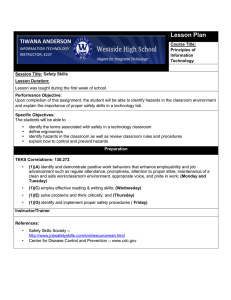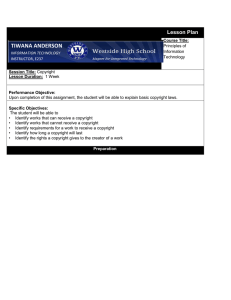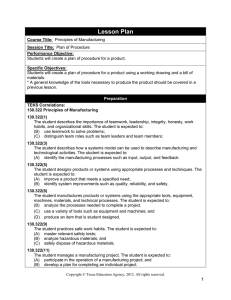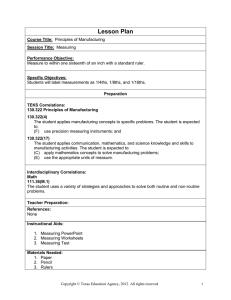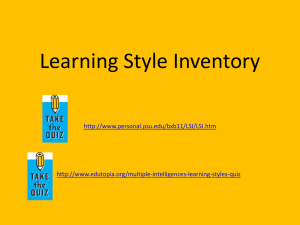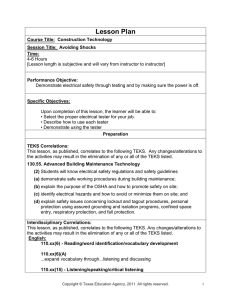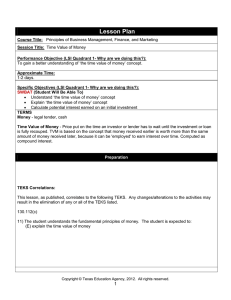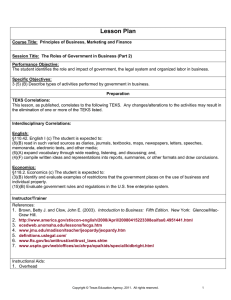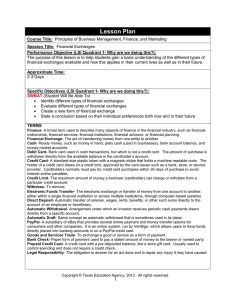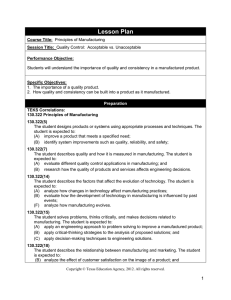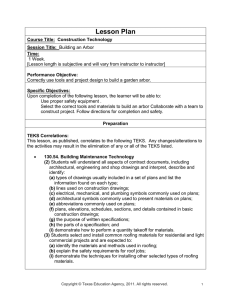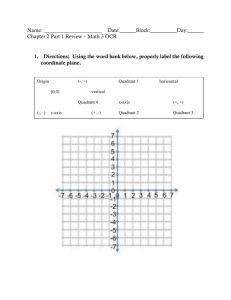Lesson Plan
advertisement
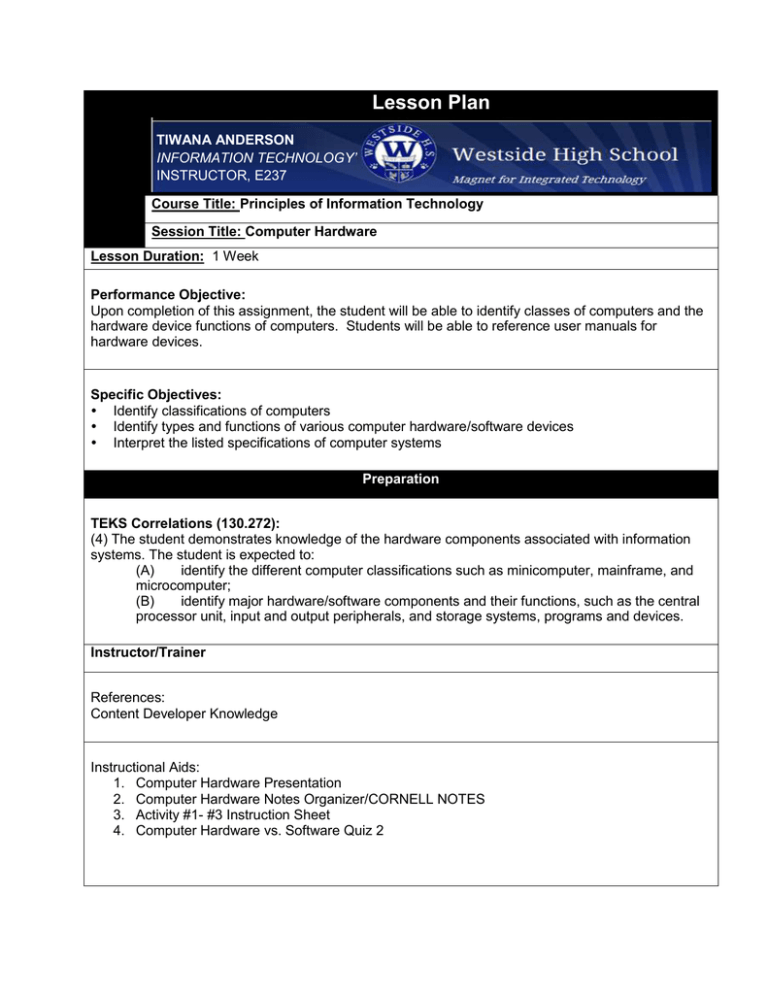
Lesson Plan TIWANA ANDERSON INFORMATION TECHNOLOGY’ INSTRUCTOR, E237 Course Title: Principles of Information Technology Session Title: Computer Hardware Lesson Duration: 1 Week Performance Objective: Upon completion of this assignment, the student will be able to identify classes of computers and the hardware device functions of computers. Students will be able to reference user manuals for hardware devices. Specific Objectives: Identify classifications of computers Identify types and functions of various computer hardware/software devices Interpret the listed specifications of computer systems Preparation TEKS Correlations (130.272): (4) The student demonstrates knowledge of the hardware components associated with information systems. The student is expected to: (A) identify the different computer classifications such as minicomputer, mainframe, and microcomputer; (B) identify major hardware/software components and their functions, such as the central processor unit, input and output peripherals, and storage systems, programs and devices. Instructor/Trainer References: Content Developer Knowledge Instructional Aids: 1. Computer Hardware Presentation 2. Computer Hardware Notes Organizer/CORNELL NOTES 3. Activity #1- #3 Instruction Sheet 4. Computer Hardware vs. Software Quiz 2 Materials Needed: • Poster-board, glue, markers – Keyboard • Copies of Notes Organizer, Instruction Sheets, and Test Equipment Needed: 1. Computer and Projector for Presentation 2. Computers for individual student use with Internet access Learner Have students look through advertisements for computer systems. Have them pair up and compare the differences, besides the cost of the systems. Note: The objective of this exercise is for students to become aware of the many details of a computer system. Introduction MI Introduction (LSI Quadrant I): SAY: Have you ever wondered what it is that makes your computer work? SAY: Have you ever gone shopping for a computer but didn’t understand what all the gigahertz and terabytes terms meant? SAY: In this unit you will learn about the hardware that makes up the computer and what those pieces of hardware do to make the computer work for you. Outline MI Outline (LSI Quadrant II): I. II. Instructor Notes: Students identify classifications of computers (slides #4 - #6) Students identify functions of various computer hardware devices (slides #7-16) Suggest websites that link to information about different types of computers. Instructor should use a computer and projector to display the presentation: Computer Hardware. Handout the Computer Hardware Notes Organizer, 1 per student, to aid them in note taking during your presentation. IT: Principles of Information Technology: Computer Hardware Plan Copyright © Texas Education Agency, 2013 2 III. Students interpret listed specifications of computer systems Activity #1: Also listed in guided practice below. Students will use Internet to locate information about computer systems and make a display board Handout the Activity #1- #2 Instruction sheet, 1 per student. Review the instructions for Activity #1; explain to students what you expect to see on the display board. Activity #2: Also listed in independent practice below. Students will use Internet to locate information about printers for personal use along with the cost of replacement cartridges. Tell students to refer back to the Activity #1- #2 Instruction sheet. Students will complete the review activity listed below in the Summary section. Place the students in pairs or groups of three for this activity. Students will complete the exam activity listed below in the Evaluation section. Students will do this individually. Review the instructions for Activity #2; explain to students what you expect to see on the display board. Answer key provided in lesson documents. Application MI Guided Practice (LSI Quadrant III): Activity #1: Students will research computer systems using the Internet and compare the two systems by displaying information on a poster-board. MI Independent Practice (LSI Quadrant III): Activity #2: Activity in which students will use device/user manuals to access information about various hardware devices and record their answers on a worksheet. Summary MI Review (LSI Quadrants I and IV): In pairs, have students ask questions of each other from the lesson note organizers they filled out at the beginning of the lesson. Evaluation MI Informal Assessment (LSI Quadrant III): Discussion comments during introduction activity Observation of note-taking during presentation of lesson presentation Guided practice activity MI Formal Assessment (LSI Quadrant III, IV): Activity #2: Activity in which students will use device/user manuals to access information about various hardware devices and record their answers on a worksheet. QUIZ 2: Questions over Computer Classifications and Hardware Functions Extension MI Extension/Enrichment (LSI Quadrant IV): IT: Principles of Information Technology: Computer Hardware Plan Copyright © Texas Education Agency, 2013 4 Enrichment #1: Have students find the most expensive personal computer on the market and list the details of its capabilities. Enrichment #2: Have students research personal computer capabilities of 5 years ago and then tell how much these capabilities have changed. Icon MI Differentiated Teaching Strategies Personal Development Strategies/Modifications Lecture, discussion, journal writing, cooperative learning, word origins Reading, highlighting, outlining, teaching others, reciting information Logical/ Mathematical Problem solving, number games, critical thinking, classifying and organizing, Socratic questioning Organizing material logically, explaining things sequentially, finding patterns, developing systems, outlining, charting, graphing, analyzing information Visual/Spatial Mind-mapping, reflective time, graphic organizers, color-coding systems, drawings, designs, video, DVD, charts, maps Developing graphic organizers, mindmapping, charting, graphing, organizing with color, mental imagery (drawing in the mind’s eye) Verbal/ Linguistic
